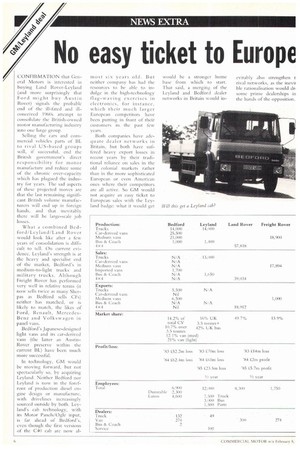No easy ticket to Europe
Page 6

If you've noticed an error in this article please click here to report it so we can fix it.
CON I RMATION that General Motors is interested in buying Land Rover-Leyland (and more surprisingly that Ford might buy Austin Rover) signals the probable end of the ill-fated and illconceived 1960s attempt to consolidate the British-owned motor manufacturing industry into one large group.
Selling the cars and commercial vehicles parts of BL to rival US-based groups will, if successful, end the British government's direct responsibility for motor manufacture and reduce some of the chronic over-capacity which has plagued the industry fir years. The sad aspects of these projected moves are that the last remaining significant British volume manufacturers will end up in foreign hands, and that inevitably there will be large-scale job losses.
What a combined Bedford/Leyland/Land Rover would look like after a few years of consolidation is difficult to tell. On current evidence. Leyland's strength is at the heavy and specialist end of the market, Bedford's in medium-to-light trucks and military trucks. Although Freight Rover has performed very well in relative terms (it now sells twice as many Sherpas as Bedford sells CI's) neither has matched, or is likely to match, the likes of Ford, Renault, MercedesBenz and Volkswagen in panel vans.
Bedford's Japanese-designed light vans and its car-derived vans (the latter an AustinRover preserve within the current BL) have been much more successful.
In technology, GM would be moving forward, but not spectacularly so, by acquiring Leyland. Neither Bedford nor Leyland is now in the forefront of production diesel engine design or manufacture, with drivelines increasingly sourced outside by both. Leyland's cab technology, with its Motor Panels/Ogle input, is far ahead of Bedford's, even though the first versions of the C40 cab are now al
most six years old. But neither company has had the resources to be able to indulge in the high-technology flag-waving exercises in electronics, for instance, which their much larger European competitors have been putting in front of their customers in the 'past few years.
Both companies have adequate dealer networks in Britain, but both have suffered heavy export losses in recent years by their traditional reliance on sales in the old colonial markets rather than in the more sophisticated European or even American ones where their competitors are all active. So GM would not acquire an easy ticket to European sales with the Leyland badge: what it would get would he a stronger home base from which to start. That said, a merging of the Leyland and Bedford dealer networks in Britain would in evitably also strengthen t rival networks, as the inevit ble rationalisation would dr. some prime dealerships in the hands of the opposition.




























































